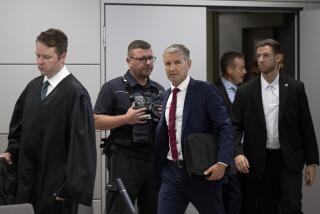Honecker Due to Be Freed After German Court Aborts Trial : Justice: Ex-Communist leader is dying of liver cancer. He is expected to be reunited with his family in Chile.
- Share via
BONN — Freedom appeared imminent today for Erich Honecker after Berlin’s highest court ruled that it violated the “human dignity” of the former East German Communist leader to try him for manslaughter when he is dying of liver cancer.
Although the 80-year-old Honecker remained in a prison hospital overnight, preparations were under way for his departure to Chile, where he is expected to be reunited with his exiled family and live out his remaining days in a Santiago clinic.
Defense attorney Wolfgang Ziegler said Honecker was too ill and “depressed” over his failing health to celebrate his legal victory after a two-year battle to avoid trial. The chief architect of the Berlin Wall “can no longer display normal reactions,” Ziegler told reporters after charges were dropped on humanitarian grounds.
The state prosecutor’s office immediately challenged the decision, but the complaint is unlikely to prevent Honecker from leaving.
Police were on standby to escort Honecker to the airport while his lawyers arranged for a passport to be issued in his name, according to the German news agency Deutsche Presse-Agentur.
In Chile, Foreign Minister Enrique Silva Cimma said Tuesday that, if the German courts release Honecker, “it is a humanitarian problem and he can come to Chile.”
Graciela Alvarez, spokeswoman for a Chilean support committee for Honecker, said Government Affairs Minister Enrique Correa Rios told the committee that the government will pay for Honecker’s medical treatment. But Correa told reporters, “No, that’s a family matter.” Alvarez said the family cannot afford the expenses.
In Germany, Honecker’s sensational trial was aborted after Berlin’s Constitutional Court ruled Tuesday that the former East German leader “in all likelihood would not survive” the process, expected to drag on for at least a year. The criminal court where Honecker went on trial Nov. 12 quickly agreed to drop the charges.
A second criminal court in Berlin is expected to follow suit early today and lift its own warrant against Honecker on embezzlement charges, clearing the way for him to leave the country.
Honecker had been charged in the deaths of 13 East Germans, shot while trying to flee across what was once the world’s deadliest frontier. Human rights organizations estimate that at least 200 East Germans were killed along the frontier that split the two Germanys for most of the Cold War. Countless others who never made it that far were imprisoned, if they were even suspected of plotting an escape.
Prosecutors argued that the man who ruled East Germany with an iron fist for 18 years must be held responsible for “shoot-to-kill” orders he allegedly issued to his border guards. The number of counts against him was reduced from 75 to expedite the trial.
Doctors have said that an inoperable liver tumor will likely kill Honecker in three to six months, but the frail patient has outlived such grave predictions several times in the past.
In Bonn, Justice Minister Sabine Leutheusser-Schnarrenberger said the decision to free Honecker took her by surprise, but “we accept this decision and will live with the consequences.”
Honecker initially went on trial with five other key East German officials arrested after that country’s grass-roots revolution in autumn, 1989, and its unification with West Germany a year later. But Honecker’s declining health already had forced the court to separate his trial from the others’.
The sometimes bizarre turns in the trial occasionally made it seem more histrionic than historic. The chief judge was forced to step down last week after trying to get Honecker’s autograph for an alternate juror, who was also dismissed.
The case had been riddled with intrigue and wrought with emotion from the outset.
After being ousted as Communist Party chairman on Oct. 18, 1989, and watching the formidable Berlin Wall crumble less than a month later, Honecker went into hiding as angry East Germans began demanding his arrest.
After undergoing surgery to remove a malignant kidney tumor, Honecker was arrested on Jan. 29, 1990, only to be released a day later because of his poor health. He was given refuge by an Evangelical pastor, then taken to a Soviet military hospital near Potsdam that April.
Manslaughter charges were filed against him on Nov. 30, 1990, and on March 13, 1991, the Soviet Union used a military jet to spirit Honecker away to Moscow.
After the failed military coup in Moscow that summer, Honecker and his wife, Margot, fled to the Chilean Embassy to avoid extradition. That touched off an international tug of war that lasted for seven months, until a Russian medical team declared that he was faking cancer and the Chileans could no longer claim humanitarian reasons for sheltering him.
Attempts to find a country willing to give him refuge failed, and Honecker was returned to Berlin last July and imprisoned pending trial.
Times staff writer William Long in Santiago, Chile, contributed to this report.
More to Read
Sign up for Essential California
The most important California stories and recommendations in your inbox every morning.
You may occasionally receive promotional content from the Los Angeles Times.











